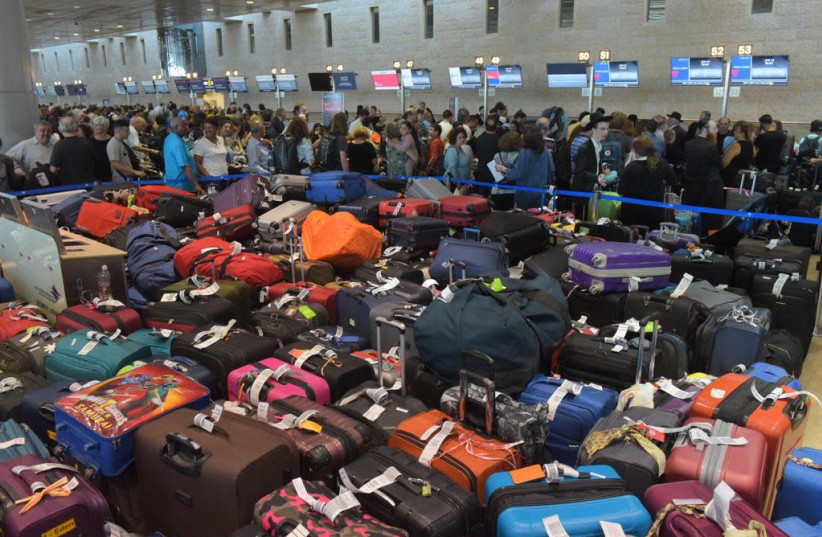These days, the news is full of the challenges that travel presents to all of us. Travelers are regularly confronted with a raft of canceled flights; while often even the replacement flights are later canceled. Add to that the backup of misplaced, lost and unidentified luggage worldwide, which makes travel even more stressful. However, when we start losing track of people as happened this past week at Ben-Gurion Airport, it brings us to a very different level of the perils of travel.
Witness the case of Morris Wolinetz, a 90-year-old Chicagoan who was in Israel to visit his children, grandchildren and great-grandchildren, and was due to travel home June 12 on United Airlines’ late night flight (actually at 1 a.m. the next morning) to the United States. His children, who live in Ma’aleh Adumim, drove him to the airport, arriving there at 9 p.m., a full four hours before the flight’s scheduled departure.
Although he has some mobility issues, he is in good shape for someone his age but still prefers to negotiate airports in a wheelchair. His kids took him to the wheelchair staging area inside Entrance 32, registered him, and then sat there for a full 90 minutes before someone showed up with a wheelchair. So while that seemed an inordinate amount of time to wait for the chair, they still have 2-1/2 hours before departure so... no problem - or so they thought.
After check-in, the children bid him goodbye at the entrance to the security check where airport personnel were escorting him in a wheelchair. The flight boarded relatively on schedule, left the gate more or less on time and, as the aircraft was taxiing to the runway a mechanical issue developed that forced the crew to bring the plane back to the gate. It was not too much later when the passengers were advised that there was no easy fix for the problem and they would not take off that night, but rather the next evening.
Morris did not have a cell phone with him but he was able to borrow someone else’s to notify his daughter in Chicago that she should not bother picking him up and that he had no idea when he would return home. Then the fun began.

He waited for someone to take him in a wheelchair from the plane and, after some time, airport personnel did get him to the baggage claim area. There they simply left him to fend for himself: no wheelchair, no assistance, no cell phone, just an older man with mobility issues forced to retrieve his luggage from Carousel 6 and figure out how to exit the airport.
In preparing for this piece, I asked Mr. Wolinetz where United Airlines was in all of this. He said that once they got him off the plane and into the hands of local airport personnel, he never saw them again. He had no further contact with United Airlines except to rebook his flight for early the following week.
With help from another passenger, he was able to walk for five and a half hours. Fortunately, his daughter in Chicago called his children in Israel who were already on the way back to the airport to try to find their dad, recognizing the fact that, because of security issues, they could not get into the baggage claim area to look for him.
Morris sat there alone, no food, no water, and no ability to use the restroom for almost two hours. At the very beginning of this ordeal, a member of the airport staff saw Morris’s predicament and said she would find someone to bring him a wheelchair and assist. However, for the next 90 minutes, not a single solitary person at the airport seemed concerned about his welfare while his family was worried sick about being able to locate him and wondering how he was faring under this stressful situation.
Fortunately, just after 4 a.m. someone finally came along with a wheelchair. Morris gave his children’s phone number to that person who called the kids who were approaching the airport and they arranged to meet each other.
Advice for these situations
The sequence of events is important here. Putting aside all of the anguish caused by the canceled flight and the attendant uncertainty of what happens next, a human being effectively fell through the cracks of an airport in the most technically advanced country on the planet.
As in most of these situations, we know how to do this better. We have the technology to be able to track people who might have issues fending for themselves in stressful situations (e.g. children, the elderly and the infirm). Using that technology would at least allow airport personnel to know who needs assistance.
In addition, we need to arrange to have people in the airport whose only job is to wander the halls looking for people under stress who need assistance. After all, tradition teaches that we have a moral obligation to look after the stranger and none of us would want this to happen to our relatives or us.
We have an obligation to make sure these kinds of things do not happen anywhere in Israel, and certainly not in a controlled area where we have the technology to track people. Travelers to and from Israel deserve nothing less.
The writer has lived in Israel for 38 years, is CEO of Atid EDI Ltd., a Jerusalem-based international business development consultancy, former national president of the Association of Americans and Canadians in Israel, former board chair of the Pardes Institute of Jewish Studies and president of Congregation Ohel Nechama in Jerusalem.
